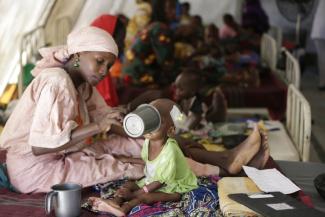Nigeria
A country at rock bottom

Kinzel is a frigate captain and was deputy military attaché at the German embassy in Nigeria from 2013 to 2016. He identifies four sources of crisis:
- the threat posed by Boko Haram, the Islamist terror militia, which has caused famine in the north-east of the country,
- acts of sabotage against oil production in the Niger Delta,
- smouldering tensions between crop and livestock farmers in the country’s so-called “middle belt” and
- the aspirations of Biafra secessionists in the country’s south-east.
Although Boko Haram has lost influence, the terror group is still operational, according to the author. Kinzel is sceptical about the December 2015 announcement by Nigerian President Muhammadu Buhari that Boko Haram is all but defeated. The SWP scholar argues that Boko Haram has split into two factions, one of which has withdrawn to Nigeria’s north-eastern region where it originated and harasses civilians with bombs, suicide attacks and armed robberies. Following the strategy of the international terror organisation ISIS, the other faction is directing its attacks against state property, churches, foreigners and international agencies, Kinzel states.
“Due to the disastrous security situation, agriculture and food supply have nearly collapsed in north-eastern Nigeria,” he writes. According to UNICEF, more than 4 million people are at risk of famine, and there are now 2.6 million internally displaced persons (IDPs). In the region concerned, people’s suffering is worse now than it was in 2009, when the radicalisation of Boko Haram began. According to the SWP expert, it indicates just how volatile the region is and that social injustices contributed to Boko Haram’s rise. The IDP problem must not be underestimated either, he insists. Although Nigerians are too poor to flee to Europe in large numbers, they already constitute the largest group of refugees arriving in Italy.
The conflicts in the Niger Delta are of an entirely different nature – but they too weaken the state. Various parties are launching attacks on oil infrastructure and pipelines and demand a bigger share of resource revenues, according to Kinzel. The situation is confusing, and the ties between the various groups are not well understood. They range from criminal gangs that want to plunder all the way to political movements that actually hope to improve the people’s living conditions. The Nigerian government is attempting to solve the problems by military means, Kinzel writes. It introduced a new strategy in 2016 and is now reaching out to the civilian population by building schools and medical facilities in order to improve the standard of life. In view of its budget problems, however, the author doubts the government will fully implement this strategy.
In the middle of the country, a conflict between nomadic livestock herders and settled farmers has been smouldering for decades. Since 2014, violent clashes have left more than 1,000 people dead, Kinzel writes. In his eyes, the reason is worsening resource scarcity due to climate change and population growth. Since the state’s presence cannot be felt in wide areas, both sides are becoming armed increasingly. Similar conflicts haunt various countries on the southern rim of the Sahara, including Chad (see article by Djeralar Miankeol in D+C/E+Z e-Paper 2015/07, p. 24).
To overcome the crises, Nigeria needs fast, comprehensive and – most important – long-term help, according to the SWP expert. The low oil price has reduced government revenues, and that trend is aggravating all problems. Kinzel believes that Germany should support the Nigerian police and armed forces, for example by training them in terms of crowd and riot control, thus contributing to containing violent conflicts. Training could serve to make police officers and soldiers behave as dependable public servants, thereby winning the respect and trust of the people.
Sabine Balk
Link
Kinzel, W., 2016: Nigeria is faltering – and not only because of Boko Haram.
https://www.swp-berlin.org/fileadmin/contents/products/aktuell/2016A80_kzl.pdf







